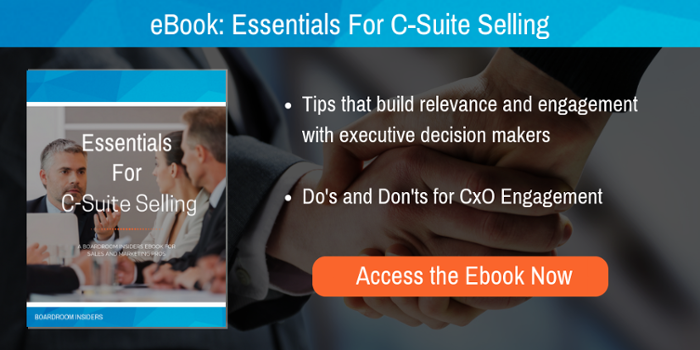
Most tech vendors say they want to be seen as trusted partners, not faceless product pushers. And many of their ultimate customers—CIOs—also say that they are looking for more from their vendors than transactional relationships. They want and expect more.
If both sides want the same thing, why aren’t they getting it?
Let’s look at this from the customers’ perspective.
Apparently, most CIOs don’t think their vendors are up to the task. According to a recent joint CEC/IDC study, only one in 10 IT leaders feel “highly satisfied” with the performance of their most strategic vendors, CIO reported. And, they added, only 46 percent of these buyers feel their most strategic vendor partners regularly demonstrate roadmap alignment.
Do Your Homework and Connect the Dots
Anecdotes from real CIOs, such as this article published in CIO late last year reveal CIOs frustrations with vendors who are unwilling or unable to connect the dots between their “widgets” and their customers’ business.
Andrew Santacroce, VP of Technology Development at TMNA Services, told CIO, “CIOs more often need a ‘partner’ who understands that widget’s role in customer success.”
Chuck Scharnagle, CIO of the Mohegan Tribe of Indians of Connecticut echoed this thought, saying, “I need someone who really wants to understand what we need to be successful.”
So, how can you show your customer that you understand what they need to be successful?

Recommendation 1: Do your homework. Find out what their priorities are and look for a “hook” that connects right back to your offering. When you communicate with them, talk directly about how your offering can help them achieve their goals. This will help you get your foot in the door, establish your credibility, and build a foundation on which you can start to build a long-term, trusted relationship.
Be Patient and Build Trust Over Time
“The best CIOs buy based on relationships and trust, Santacroce told CIO. “…in today’s world, there are likely multiple solutions to choose. With trust, built over time, and a strong relationship poised to last well beyond the current opportunity, pricing will get sorted and a mutually beneficial deal will be inked.”
Joel Jacobs, Mitre Corp.’s VP, CIO, and CSO, would likely agree. He told CIO in 2018 that because his vendors know Mitre Corp.’s business and environment, there’s a level of trust and collaboration that’s hugely beneficial. He says that his trusted vendors can easily adapt to changing conditions, are willing to jump in and help in a crisis, and can participate in an open and direct dialogue on performance and their product/service plans.
EURPAC Service, Inc. CIO Mike Skinner also shared his wish list for vendors with CIO. “First, is the vendor willing to take the time to learn about our business and our value proposition? Second, will the vendor support us on good days and bad? Will they be there when we need them most? And third, are our strategies aligned? Are we likely to grow in directions that create synergy or separation?”
Most vendors would view this as a dream relationship come true. Because if you talk with them, they are weary of competing on price alone and having their products commoditized. Again, it seems as if vendors and CIOs want the same things.

Recommendation 2: These relationships don’t happen overnight. And they don’t happen with every single customer, either. Identify the customers with the most potential and willingness to forge partnerships and put extra effort into building those trusted relationships over time.
Prove the Value of What You Deliver
Of course, most customers also apply a set of objective measurements to their vendors--and failure to measure up will eventually trump trust and relationships. To ensure that vendors are appropriately evaluated, some companies have well-defined vendor relationship management programs and processes. GSK for example, uses after-action reviews. “These reviews help us extract key learnings and ensure we apply them to future engagements,” said the company’s VP of U.S. Technology, Matt Lasmanis.
Ken Piddington, CIO and Executive Advisor of MRE Consulting, says effective vendor management programs include a component that measures effectiveness with scorecards that breakdown performance and are weighted based on the partner’s category and type of product/service provided.

Recommendation 3: It’s in your best interest to prove that what you are doing is helping the customer achieve their objectives, so do everything you can to prove value, including enthusiastically participating in any required customer evaluations or measurement programs.
In Conclusion
While CIO customers and vendors both seem to want the same things, let’s face it: it is up to the vendor to do the heavy lifting to prove they are worthy of “partner” status. What CIOs are telling vendors is really very simple. They’re counting on you. They need to know that you’re committing to them in a way that’s going to be mutually beneficial. Beyond delivering the expected high-quality products and services, they want implicit assurances that you’re going to look out for their best interests. In turn, you’ll benefit from having their business.
As Scharnagle said, “If we’re successful and are a customer of yours, we should be helping your success, as well.”







Share Your Thoughts